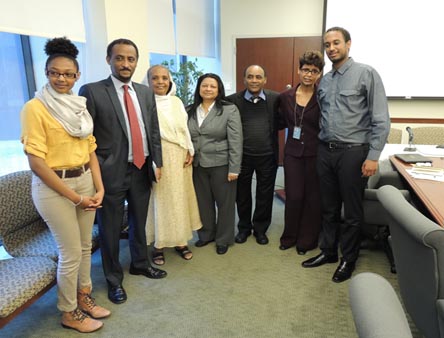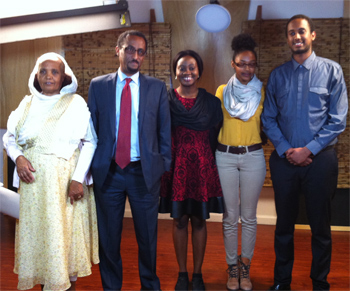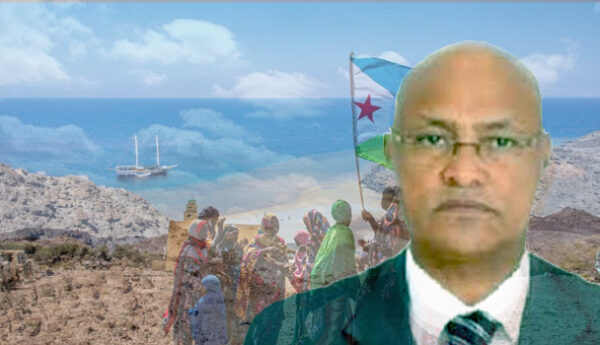Younis: Disengage from Isaias Afwerki; Engage Alternative Voices

[This is the entire text of the speech made by Saleh Younis, and addressed to attendants of an event organized by Eritrean and international human rights activists and was attended by Eritreans, friends of Eritrea, the Africa Desk of the UN, and the German Mission, and the Human Rights Rapporteur, Sheila Bedwantee Keetharuth, designated to Eritrea. (Her mandate is to monitor human rights violations and gather testimonies from Eritreans.) The session was held in New York on Thursday, October 24, 2013.]
Good afternoon.My name is Saleh Younis, and I am an Eritrean citizen.Today, I come to speak to you about an average Eritrean family, with an average Eritrean story: victims of the Isaias Afwerki regime.It is the story of my family.Please bear in mind that when I say that this is the story of an average Eritrean family, it means that the fate of others is far worse.
My father, my brother and my niece have been in prison since December 2012.That is three generation of Eritreans.
My father, Abdu Ahmed Younis, was born in Keren, Eritrea in 1928. He is 85, and this is his fourth arrest in the last 12 years.An 85-year-old man has many health issues and, in his case, the arrest came a month after he had open heart surgery in Jordan. Neither I, nor any of our family members, know why he is arrested. The longest term he served was in 2001 (for 3 plus years) when he, and other elders, offered to mediate the dispute between two sides of the ruling party. What he considered a duty of a citizen—and elder citizen—to exercise the traditional role of an elder—was interpreted by the Isaias Afwerki regime as taking sides in a matter that should not involve a citizen: having a say in how he is governed.This time, we do not know why he is arrested: he has not been charged with any crime, he hasn’t been brought to a court of law; he hasn’t been sentenced. The family has no visitation rights.
My brother, Hassen Abdu Ahmed, was born in Asmara in 1975. He is 38. His story is that of the average 38 year old Eritrean: exiled, returned with my father to Eritrea in 1992, and he has been with the National Service since 1995. That is 17 years of conscription in the army, followed by one year in jail. He, too, was arrested in December 2012.Again, we do not know why he is arrested: he has not been charged with any crime; he hasn’t been brought to a court of law; he hasn’t been sentenced.

Left to right: Weizero (Mrs.) Mezgeb Mengistu (mother of Aster Yohannes and mother-in-law of Petros Solomon); Saleh Younis; Adeola Fayehun (host of Sahara TV), Me’Aza Petros Solomon, and Zerai Petros Solomon
My niece, Ciham Ali Abdu, was born on April 3, 1997 in Los Angeles, California.She is 16 now.She was arrested when she was 15, on December 8 (ironically, World Children’s Day) in Hashferay and then transferred to Adi Abeyto prison on December 25 (Christmas Day.) A Christmas present for her mom. Since March 12, she has been moved out of Adi Abeyto but no family member knows where she has been transferred.Again, since there is no explanation, we the family are left to draw conjectures: perhaps she is being held hostage to ensure that her father, Ali Abdu Ahmed, the former minister of information who abandoned the regime and sought political asylum in the West, is daily reminded that his daughter’s fate is in their hands.
When I say this is an average family, it means there are Eritrean families in even worse condition. Consider: Eritreans who were arrested in 1994 because they were Muslim fundamentalists. Their families have been suffering for nearly 20 years. Consider the case of Tewelde Beyn, an Eritrean from Keren, who disappeared together with the famous poet Echet Hina and other 15 innocent souls without trace in 1977, because they were not supportive of the EPLF. Now consider: his grandson, Yohannes M. Tewelde Beyn, who, like many people his age, was exiled out of his country: he is one of the Lampedusa victims of October 3rd. His aunt, Leteab Tewelde Beyn, failed to locate him with the survivors or the dead in Lampedusa.
Each of our stories here, our testimonies, can be readily dismissed–and the Eritrean regime is good at that. But can it dismiss the cumulative testimonies of thousands and thousands of Eritrean families?
It is normal, and the duty of governments, to imprison people considered threats to national security.The problem here is one of degrees: Eritrea’s is extreme by any measure.There are tens of thousands of Eritrean families who are in even worse shape: families who have lost their only children; families separated for decades; families who do not know the whereabouts of their loved ones for decades: no charges, no trial, no court, no right to self-defense, no right to hearing charges against you, no sentence, no family visitation. Families who have endured longer and more intense pain. You hear cries about injustice all over the world. The problem in Eritrea is not just lack of justice; it is lack of verdict. Lack of decency.It is rule by a mob, rule by gangsters.
From where you sit, I am sure you are thinking: “what do you want us to do about it?This is all terrible, but the world is full of terrible news: what can we do?” The one thing you can do is understand the nature of the regime—truly understand it—because if you did, you would know all the well-intentioned “engagement” and “discussions on the margins of the conference” and “new initiative” that you individually or collectively dream up are all futile. All they do is legitimize an illegitimate government; extend it a lifeline and tacitly endorse its wanton human rights violations.You are trying to reform something that is beyond reform.
Many of you have been hoodwinked.You have looked at the “African dictator for dummies” manual and said there are no statues of Isaias Afwerki in Eritrea, so he must not be a dictator.He has not given himself outrageous titles like Field Marshall and doesn’t wear uniforms and sunglasses, so he must not be a dictator.He doesn’t dress up in $1,000 dollar brand suits so he must not be a dictator.He doesn’t have villas in Europe, so he must not be a dictator.But one can be a dictator and still live a Spartan life: a dictator’s obsession is power, and what he does once he has the power differs with each tyrant.
Let me be blunt: THERE IS NO GOVERNMENT IN ERITREA.Even to call it “a regime” implies a system, a structure and a hierarchy.In actual fact, Eritrea is the State of Isaias Afwerki. It is a tyrannical police “state”: there was a systematic subversion of state power by party, and an even more intense subversion of party power by an individual.So now, the State is The Man, and The Man is the sum total of his mad contradictions. This was done by creating parallel infrastructure: illicit and informal.Because members of this illicit and informal infrastructure are themselves rotated in and out of jail, their loyalty is to one man: the president.
One simple example: Eritrea has a ministry of finance, defense, fisheries, energy, mining, transportation, trade and industry, agriculture.It has authorities: airlines, ports, shipping lines.If you were to ask the ministers and directors to speak about the policy of their ministries, they couldn’t say much. I have said before—in an interview with Expressen—that if you were to take all the ministers and water-board them, they would not be able to give you anything of substance of how the regime runs. Because all the power and authority that should reside in their ministries belongs to the “government garages” led by a colonel who is nowhere in the government structure.Those who work in the “government garages” call their institution Somaliland—just like Somaliland is autonomous of Somalia, the government garages are autonomous of the government structure.When you read the Somalia Eritrea Monitoring Group (SEMG) report, which talks about how much time Isaias Afwerki spends in meetings with “government garages”, here’s the context: that is his real meeting with his real ministers, as opposed to the rubber stamp “Ministerial Cabinet” that is often televised, showing images but no voices.More recently, Isaias Afwerki has created a “people’s army” that has no reporting structure within the Eritrean Ministry of Defense or its Eritrean Defense Forces.
The rule of Isaias Afwerki is absolute.He controls the state media, the security apparatus, its army, its finance, its housing, its fuel supply, its land distribution, its potable water distribution. Let me give you an example: when Forto 2013 occurred (mutiny of Eritrean army in January 20, 2013), I was discussing it with someone who has better information than me and I was talking about reports that tanks moved from Tsorona (bordering Ethiopia) to Asmara and he stopped me cold and said, “Impossible! Fuel is personally rationed by Isaias Afwerki: that couldn’t have happened without his knowledge.”
Isaias Afwerki decides which singers should go on which tours, which pavement should be patched, what crop should the farmers sow this year, how far they should plough, which private hospital should be closed, which shop keeper should be licensed, what curriculum should be taught; who should be sentenced for years and who for life sentence…whose wife should be abused so that the husband will be humiliated: the ultimate insult in Eritrean culture. He is the one who declares war and peace; at the same time he is the one who decides what color should be painted a certain house.
A mad man is in charge of a country.A paranoid, antisocial, narcissistic, and sadistic man with schizophrenic tendencies, including excessive grandiosity. How do you deal with a mad man? Study his behavior: there is a pattern.Step One: he pretends big earth-shaking events—like 360 citizens drowning in the Mediterranean—are not happening.Step Two: when he begins to feel the impact, his reaction is to ridicule it.Invent new words of insult and mockery. A lullaby for his devotees. Step Three:when he is really cornered and there is no way out, he has absolutely no shame in making 180-degree turn and to yield to it.He will accept things he was begged to accept: but only if he is pressured and cornered.
Change in Eritrea will come, and it will stick, when enough Eritreans inside and outside the country believe it’s necessary and timely and execute it.It is OUR responsibility.But the international community has its share of responsibility.If you keep this well-intentioned campaign of “engagement”—a door half ajar—you will keep getting the same things you have been getting for 12 long years.Remember, you are dealing with a man who accused the United States of being responsible for tens of thousands of his own citizens using smugglers and traffickers to leave their country. He is beyond reform: you can’t reform a mad man; you can only institutionalize him.All your well-intentioned campaigns of engagement and seeking reform have yielded you nothing, but you keep on persisting: it is your ego attempting the impossible. You need to reach a long over due decision: the same one that was reached about Saddam Hussein, Moammer Kaddaffi, and Bashar Assad: this man happens to be head of state but he is mentally unbalanced and we need to recognize and legitimize alternatives to his sadistic rule.
Thank you
Saleh Younis
Oct. 24, 2013




Awate Forum